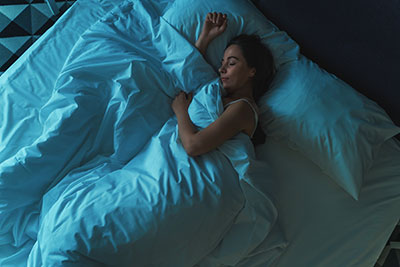 Americans are known to be sleep deprived, but those with psychiatric conditions are even more likely to be so. According to sleep research, chronic sleep problems affect 50 to 80% of patients in the U.S. with a psychiatric disorder, compared with 10 to 18% of the general population.
Americans are known to be sleep deprived, but those with psychiatric conditions are even more likely to be so. According to sleep research, chronic sleep problems affect 50 to 80% of patients in the U.S. with a psychiatric disorder, compared with 10 to 18% of the general population.
Sleep problems are particularly common in patients with depression. Studies estimate that 65 to 90% of adults with major depression, and about 90% of children with this disorder, experience some kind of sleep problem. Most patients with depression have insomnia, but about one in five suffer from obstructive sleep apnea. In a longitudinal study of teenagers, for example, sleep problems preceded depression 69% of the time.
Hypersomnia (excessive daytime sleepiness or excessive time spent sleeping) is present in about 40% of young depressed adults and 10% of older patients, with a preponderance in females. The symptoms of hypersomnia cause huge distress, have a major impact on quality of life, and are a strong risk factor for suicide.
Both insomnia and hypersomnia are often unresolved by treatment, and confer a greater risk of relapse and recurrence of depression. Additionally, studies have found that insomnia in nondepressed subjects is a risk factor for later development of depression. Because of this, there is a need for more successful management of sleep disturbance in depression, in order to improve quality of life in these patients and reduce an important factor in depressive relapse and recurrence.
Historically, doctors treating patients with psychiatric disorders viewed insomnia and other sleep disorders as symptoms. But research has suggested that sleep problems increase the risk of developing certain psychiatric disorders, such as depression. In a longitudinal study, those who reported a history of insomnia during an initial interview were four times as likely to develop major depression by the time of a second interview three years later.
Two longitudinal studies—one involving 300 pairs of young twins, and another including 1,014 teenagers—found that sleep problems developed before major depression did. Insomnia can worsen the symptoms of depressive disorders and prevent recovery. For example, Insomnia and other sleep problems affect outcomes for patients with depression. Studies report that depressed patients who continue to experience insomnia are less likely to respond to treatment than those without sleep problems.
Even patients whose mood improves with antidepressant therapy are more at risk for a relapse of they have sleep issues. Depressed patients who experience insomnia or other sleep disturbances are more likely to think about suicide and die by suicide than depressed patients who are able to sleep normally.
People with bipolar disorder are known not to sleep for days during a manic episode and then sleep excessively during the depressive phase. Studies have reported that 69 to 99% of patients experience insomnia report less need for sleep during a manic episode of bipolar disorder. However, people with bipolar disorder can also sleep too much. Some studies of bipolar patients found that 23 to 78% of patients sleep excessively (hypersomnia).
Longitudinal studies suggest that insomnia and other sleep problems worsen before an episode of mania or bipolar depression, and lack of sleep can trigger mania. In these instances, sleep problems also adversely affect mood and contribute to relapse. This research has clinical applications, because treating a sleep disorder—whether with complementary and alternative medicine (CAM) or conventional methods—may help alleviate symptoms of co-occurring mental health problems such as depression.
Dr. Randi Fredricks, Ph.D.
Author Bio
Dr. Randi Fredricks is a leading expert in the field of mental health counseling and psychotherapy, with over three decades of experience in both research and practice. She holds a PhD from The Institute of Transpersonal Psychology and has published ground-breaking research on communication, mental health, and complementary and alternative medicine. Dr. Fredricks is a best-selling author of books on the treatment of mental health conditions with complementary and alternative medicine. Her work has been featured in leading academic journals and is recognized worldwide. She currently is actively involved in developing innovative solutions for treating mental health. To learn more about Dr. Fredricks’ work, visit her website: https://drrandifredricks.com
References
Breslau N, Roth T, Rosenthal L, Andreski P. (1996). Sleep disturbance and psychiatric disorders: a longitudinal epidemiological study of young adults. Biol Psychiatry, 39(6), 411-418.
Ford DE, Kamerow DB. (1989). Epidemiologic study of sleep disturbances and psychiatric disorders. An opportunity for prevention. JAMA, 262 (11), 1479-1484.
Nutt D, Wilson S, Paterson L. Sleep disorders as core symptoms of depression. Dialogues Clin Neurosci. 2008;10(3):329-336.
Gregory AM, Rijsdijk FV, Lau JYF, Dahl RE, Eley TC. (2009). The Direction of Longitudinal Associations Between Sleep Problems and Depression Symptoms: A Study of Twins Aged 8 and 10 Years. Sleep, 32(2), 189–199.
Johnson EO, Roth T, Breslau N. (2006). The association of insomnia with anxiety disorders and depression: exploration of the direction of risk. J Psychiatr Res, 40, 700–708.
Gold AK, Sylvia LG (2016). The role of sleep in bipolar disorder. Nat Sci Sleep, 8, 207–214.
Hensch T et al. (2019). Vulnerability to bipolar disorder is linked to sleep and sleepiness. Transl Psychiatry, 9, 294.

